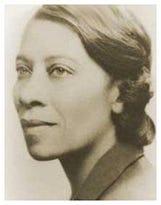Today In Black History: Dr. Marguerite Thomas Williams
First African American to receive a PhD in Geology
Issue #636 Today In Black History, Thursday, June 13, 2024
Help us to reach our June 2024 goals: +125 total subscribers and +75 paid subscribers:
Please share and subscribe to help us grow this publication.
If you like us, REALLY like us, please click the “Like” button at the end of this post!
Also, please scroll to the end of this post for other ways to financially support us and We Are Speaking with our books and courses.
We appreciate your support!
Today’s Black History WOW!
Marguerite Thomas Williams was born on November 20, 1895, in Atlanta, Georgia, and was the first African American to receive a PhD in Geology. She was a pioneer among geoscientists in recognizing how human activity and landscape management impact erosional processes and the risks of natural flooding.
Marguerite Thomas attended what was previously known as Normal School for Colored Girls. The school was later renamed Miner Teachers College and is now known as the University of the District of Columbia.
She earned her bachelor’s degree in geology from Howard University in 1923. Williams found work as an assistant professor at Miner Teachers College in Washington, D.C., where she was chair of the Division of Geography between 1923 and 1933. She was allowed a leave of absence so that she could pursue a master’s degree at Columbia University, which she received in 1930.
Between the years 1946 and 1947, out of all of the 11,000 employed scientists in the field of geology, only 3% were female. As a black woman, Marguerite Williams faced obstacles unique to other women. These obstacles increased after she was married and turned forty. Women in these categories were often employed at levels far beneath their training or skill level. Women pursuing advancements in science experience a lack of mentoring, struggle to gain respect and credibility from peers and administrators, are burdened to act as caregivers for their families, face overt discrimination, and encounter harassment/sexual harassment. African American women enrolled in doctoral programs have a high rate of isolation, lack of guidance and support from the faculty, and few opportunities to advance professionally.
Williams continued teaching at Miner for a decade before she earned her doctorate in geology from Catholic University in 1942. Her dissertation titled “The Study of the History of Erosion in the Anacostia Drainage Basin” examined a local geological feature. Williams sought to explore the factors that eventually led to the erosion observed in the Anacostia River. Her dissertation was published by the Catholic University of America Press.
After Williams earned her Ph.D., she was promoted to full professor at Miner. Her career focused on teaching rather than research. Williams taught classes in geography and the social sciences and taught night courses at Howard before retiring in 1955.
Marguerite Thomas Williams passed away on June 13, 1991.
Since 2020, the Marguerite T. Williams Award has been presented annually by the American Geophysical Union to mid-career scientists who have significantly contributed to the research or community building in earth and planetary surface processes studies.
The research done by Dr. Williams on fluvial sedimentology has impacted studies of fluvial sediments on Mars by the Mars Science Laboratory and the Perseverance rover.
Her contributions to geology inspired the development of the Marguerite Microtunnel Boring Machine (MTBM).
The University College London Department of Earth Sciences introduced a scholarship under Marguerite’s name for students who have successfully published works that invoke actions or proposed methods to counter discrimination and racism in their institution.
Dr. Williams obtained a recognition and written account from the Association for Women in Science (AWIS).
Today In Black History
In 1774, Rhode Island became the first colony to prohibit the importation of slaves.
In 1850, the American League of Colored Laborers, the first Black American labor union, was formed in New York City.
In 1865, President Andrew Johnson proclaimed Reconstruction for the Confederate States.
In 1866, the House of Representatives passed the 14th Amendment.
In 1868, former slave Oscar J. Dunn became the first Black lieutenant governor of Louisiana, the highest executive office held by an African American to date.
In 1893, Black inventor T.W. Stewart received a patent for a mop.
In 1910, Dr. William D. Cruz, a medical doctor, was appointed minister to Liberia.
In 1967, Thurgood Marshall, the U.S. Solicitor General (the person who argues cases before the Supreme Court for the federal government), was nominated to the Supreme Court by President Lyndon B. Johnson. He was confirmed by the Senate on August 30, becoming the first African American Supreme Court Associate Justice.
In 1977, Harvey Johnson was elected as the first Black mayor of Jackson, Mississippi.
In 1979, the Sioux Nation received $100 million in reparations compensation for the Black Hills in South Dakota.
Our paid subscribers are encouraged to discuss this post in our W.A.S. Chat Community.
Join Pamela Hilliard Owens’s subscriber chat
Available in the Substack app and on web
You are also welcome to view “We Are Speaking” in Substack Notes. You can also read other Substack publications without subscribing to them when you join Notes.
This post is free to read for three days. To have access 365/24/7 to our full archive, comment on our posts, and financially support “We Are Speaking” for no more than $5 per month, please subscribe at the paid level.







